#Cao Guang Yan
Text
Oh No! Here Comes Trouble (2023) - 不良執念清除師 - Whump List
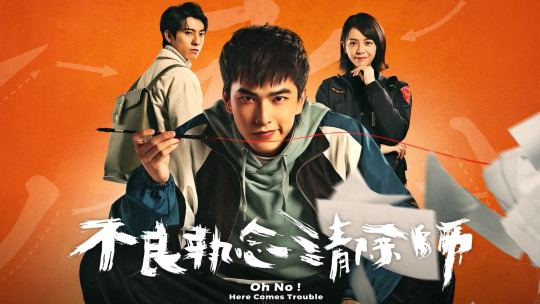
List by StayDandy
Synopsis : Pu Yi Yong is a typical high school student. When he unexpectedly gains supernatural powers after waking up from a car accident, his previously uneventful life is suddenly not so ordinary anymore. (MDL)
Whumpee : Pu Yi Yong played by Tseng Jing Hua (center)
• Cao Guang Yan played by Peng Cian You (left)
Country : 🇹🇼 Taiwan
Notes : This is a Full Whump List
• I want another season of this so badly! It was well done ... written, acted, cgi ... loved it!
• Most of the whump is comedic (until the very end), but it's still a really good show!
Episodes on List : 11
Total Episodes : 12
*Spoilers below*
01 : Cao Guang Yan falls down some steps, sprains his foot … [flashback] hit in the head with a sport-ball (3 separate times! - comedic) … [present] Pu Yi Yong is in a major bus accident, trapped under a large hunk of metal, wakes briefly before passing out again … wakes in a hospital, oxygen mask, was in a coma … (@ 31:56 you go Mama!!) … hospitalized, physical therapy, walking with crutches
02 : Faints several times in a row (comedic) … (@ 16:00 my god, personal space ma dude!) … [flashback] found under the metal at the accident site, piece of metal speared in his side, heart stopped, CPR administered … [present] put in an arm lock (comedic)
03 : (at end) Guang Yan is punched
04 : … continued from previous ep. ... (replay) Punched & knocked out (by Yi Yong), Yi Yong is punched & knocked out (by his mother 😂) … trips & falls … put in an arm lock (comedic)
05 : Hit with the butt of a metal bat … bruised, handcuffed … trips & falls … Guang Yan has a headache … Yi Yong trips & falls … legs & hands skinned up from tripping & falling several times
06 : (near end) Guang Yan is nauseous an amusement ride
07 : Yi Yong trips & falls, Guang Yan trips & falls (comedic) … Yi Yong is slapped (comedic) … (@ 29:33 Guang Yan knows all of Yi Yong's food prefs.. yeah, totally not a couple 😏) … in shock, almost punches Guang Yan without realizing … slapped (comedic) (Guang Yan has great reflexes 😂) … nightmare
08 : Slapped (comedic) (he's gonna get a concussion if this keeps up 😂)
10 : Tackled to the ground, wrist & arm scratched
11 : Falls to the ground in shock
12 : Knocked out … hands zip-tied, dragged, throws up … hit in the head with a hammer, knocked out … wakes, head pain, bleeding … in a fight … tossed over a railing, clings to the edge, falls 2-3 stories, bleeding heavily, CPR administered, coughs blood … comatose … (that ending scene legit made me cry 😭)
#whump#whump list#full whump list#Asian whump#Taiwan#Oh No Here Comes Trouble#不良執念清除師#Pu Yi Yong#Cao Guang Yan#Tseng Jing Hua#Peng Cian You#Mystery#Comedy#Drama#Supernatural#Friendship#Bromance#falls#sprain#hit in the head#hit with an object#hit with a ball#hit with a hammer#car crash#car accident#passes out#faints#collapses#comatose#knocked out
150 notes
·
View notes
Text
amusement park date💕




#taiwanese drama#tw drama#oh no! here comes trouble#Pu Yi Yong x Cao Guang Yan#Yi Yong x Guang Yan#YiYong x Guang Yan#Pu Yi Yong#Cao Guang Yan
30 notes
·
View notes
Text
Drama Review: Oh No! Here Comes Trouble (不良執念清除師)

Source: Google Images
Pu Yi Yong is a typical high school student. When he unexpectedly gains superpowers after waking up from a car accident, his previously uneventful life is suddenly not so ordinary anymore.
Source: MyDramaList (2023)
I've Missed Loving Taiwan Dramas
Not gonna lie, I watched Oh No! Here Comes Trouble for the two main male leads, that 'it's not BL but the bromance is strong' bit. I began the drama right as the final episode dropped and I really did not have high hopes for it (I haven't had high hopes in Taiwan dramas in recent years). As I literally picked this drama up only for the reason I mentioned earlier, I had no idea what I was getting into. Yes, I knew it had supernatural elements but that was all.
So imagine my delighted surprise when I was placed on one of the most emotional roller coaster ride throughout all 12 episodes of Oh No! Here Comes Trouble. I can be creeped out one second and laughing at the next second. Or, I could be laughing and tearing up sadly at the same time. Dramas that can bring me on such a wild emotional journey have a very special place in my heart, they automatically become better in my eyes because the mood/energy/vibe is not stagnant.
It isn't just the writing that wowed me. I have watched plenty of dramas or TV shows with similar concept like portraying sub-stories as the plot-catalyst for the show as a whole. The stories in Oh No! Here Comes Trouble are not earth-shattering nor gut wrenching or the best lessons one will learn. They touch on obsession and very often, the media does not focus on this side of obsession so despite the simplicity, the stories were beautifully crafted and executed.
Of course, I cannot write this review and not talk about the acting. We all know Tseng Jing Hua and Vivian Sung's (though she has only taken very average roles for now) acting is top tier so I am not going to go on about them. As a matter of fact, the entire cast consisted of familiar veteran faces, obviously the acting would be good. It was Peng Cian You that really pulled me into the drama. All three main leads perfectly portrayed their characters but because I did not know Peng initially, his performance stunned me so much especially during the CPR scene – that was not an actor playing the role of Cao Guang Yan, it was Guang Yan embodying Peng completely.
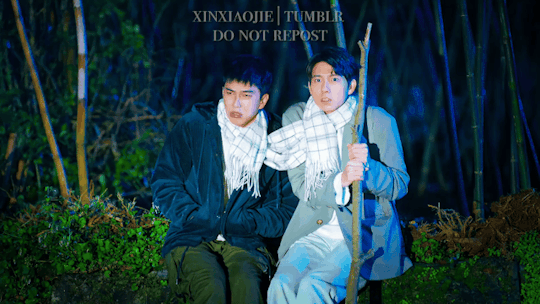
I grew up watching Taiwan dramas and for years now, I haven't had hope for them at all. Sure, I still give some a chance but I was always disappointed. Watching Oh No! Here Comes Trouble gives me hope for future Taiwan dramas but I'm a realist so I know one show will not save the whole country's industry. It's just, if you know how Taiwan drama humour was like 15 to 20 years ago, you will be able to see it in this drama. Oh No! Here Comes Trouble is not exactly nostalgic but it can bring on a new wave and I am here for it.
P.S.: Season 2 when?
Rating: ★★★★★
#drama review#oh no! here comes trouble#oh no here comes trouble#不良執念清除師#taiwan drama#pu yi yong#cao guang yan#chen chu ying#tseng jing hua#peng cian you#vivian sung#sung yun hua
39 notes
·
View notes
Photo
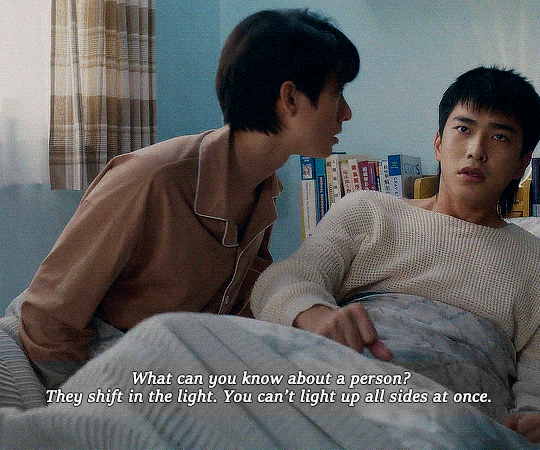


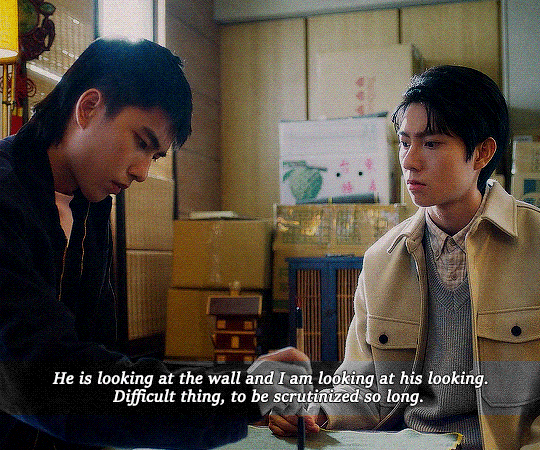
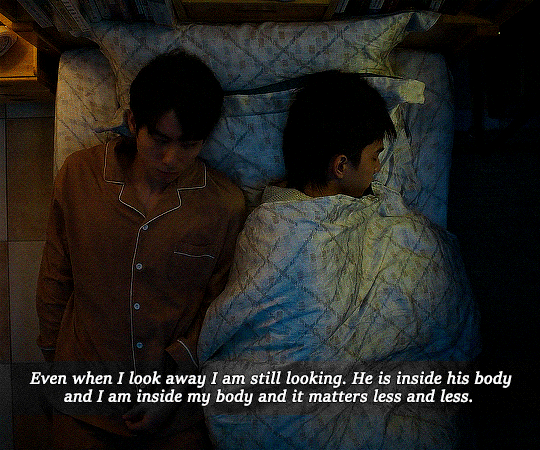

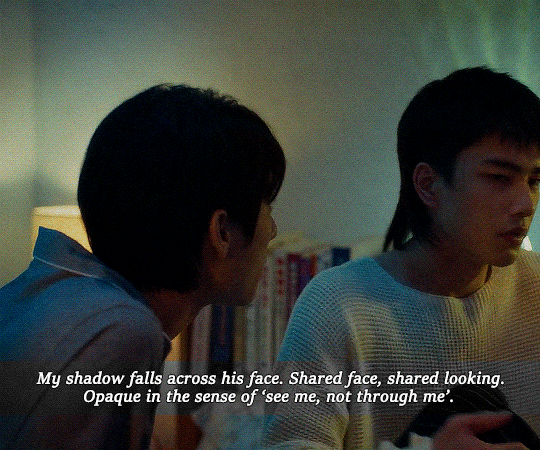
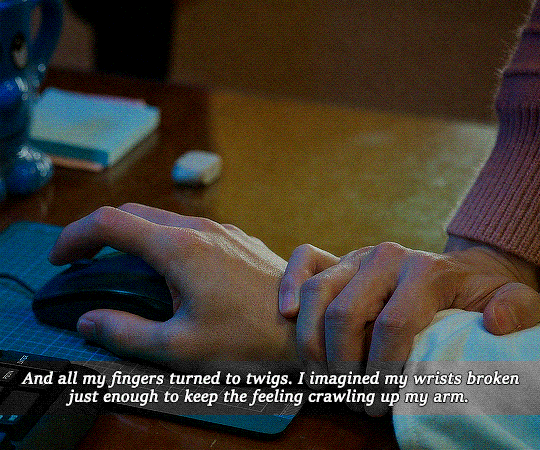
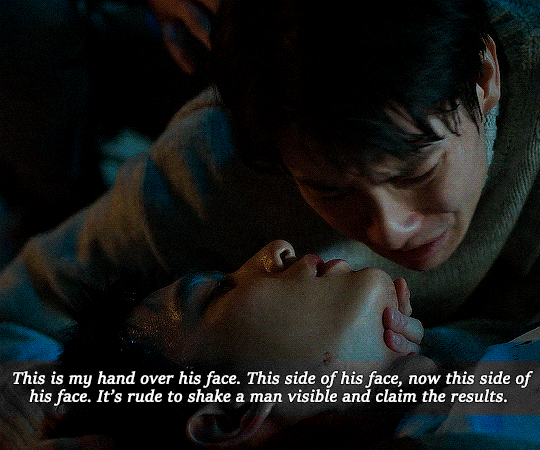

“I made a shape of the shape he made, subtracted what he shared with anyone else. It was too much to bear. I turned off the headlights of my looking and let the animal get away.”
- Portrait Of Fryderyk In Shifting Light, Richard Siken.
Tseng Jing Hua As Pu Yi Yong + Peng Cian You As Cao Guang Yan.
OH NO! HERE COMES TROUBLE (2023).
#oh no! here comes trouble#oh no here comes trouble#asiandramasource#twdramaedit#*#faiza gifs#god how DEAR they are to me ....................#yes ive messed around with the verses a LOT i wanted to find the lines that fit what i perceived so ya.#and it was allllllllllll inspired by guangyan and the way he looks at yiyong bc ......... HEAD IN HANDS. GOD.
779 notes
·
View notes
Text
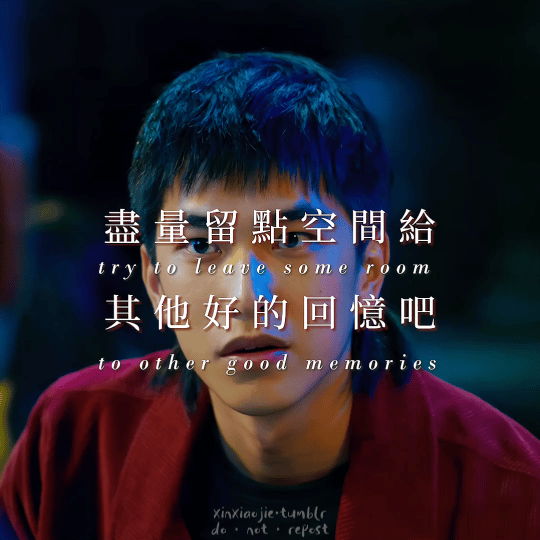
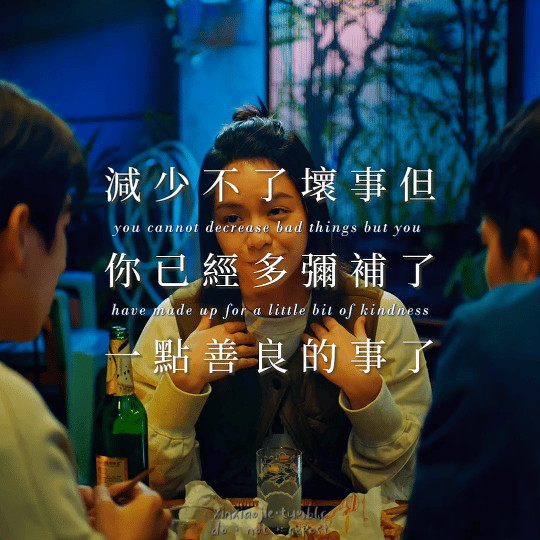

Four Treasures of the Study · 文房四宝
蒲一永 Pu Yi Yong · The Brush
Eight Principles of Yong. Traditionally, it was believed that practicing the eight common strokes in regular script, all of which can be found in the character "Yong," could lead to writing all characters well. According to legend, it was created by Wang Xizhi in the Eastern Jin Dynasty, "Yong" is also the first character in his famous work 蘭亭集序 Lantingji Xu (Preface to the Poems Collected from the Orchid Pavilion).
The surname "Pu" could potentially be a homage to the famous Chinese writer Pu Songling in the Qing Dynasty. In his most popular work 聊齋誌異 Liaozhai Zhiyi (Strange Tales from a Chinese Studio), the focus of the tales are on the emotional entanglements between humans and supernatural beings in the world.
陳楮英 Chen Chu Ying · The Paper
Chu, which refers to the paper mulberry plant, was historically used in ancient China as the raw material for making mulberry paper and Xuan paper. Additionally, "Chu" was used as a term synonymous with paper in ancient times. In EP4, Chuying mentioned that the "chu" in her name means paper.
曹光硯 Cao Guang Yan · The Inkstone
Yan, also known as Yantai, is the name of the inkstone used in calligraphy. The inkstone is used to grind the ink stick into powder, which is then mixed with water on the inkstone to create ink suitable for calligraphy.
執念 The Obsessions · The Ink
The obsessions are one of the ever-changing elements in the show, the elegiac couplets are uniquely written with whole heart and mind for the different obsessions.
#oh no! here comes trouble#oh no here comes trouble#不良執念清除師#不良执念清除师#twdramaedit#asiandramasource#dailyasiandramas#cdramasource#dramasource#twdrama#taiwanese drama#caps#chinese stuff#pu yiyong#Tseng Jing Hua#chen chuying#vivian sung#sung yun hua#Peng Cian You#cao guangyan#i dont even know if this is even interesting to anyone im just splurging thoughts and random meta#this post took 10yrs to make can you believe trying to do the write up was harder than trying to make the gifs#half way through making the gifs i realised i did it in simplified and when i tried to switch to traditional the font didnt work 🥴#i was trying to find a scene where guangyan was in his doctor action but i didnt want to use the cpr scene bc sads#this is he best one i could find where he's wearing a lab coat
318 notes
·
View notes
Text
10 characters/10 fandoms/10 tags
Tian Guan Ci Fu: Xie Lian
Yuri on Ice: Katsuki Yuuri
Slayers: Amelia Wil Tesla Saillune
Mo Dao Zu Shi: Wei Wuxian
Puella Magi Madoka Magica: Akemi Homura
Fullmetal Alchemist: Winry Rockbell
Doctor Who: Rose Tyler
Promare: Lio Fotia
Macross (overall franchise): Sheryl Nome
Gundam (overall franchise): Lacus Clyne
Rumiko Takahashi (all of her works): Higurashi Kagome
CDRAMA+one Taiwanese drama ONLY LIST because I stole this from @circumference-pie
Love Between Fairy and Devil: Xiao Lanhua (but I love DFQC almost as much, if not as much depending on the day)
Till the End of the Moon: Tantai Jin
Back from the Brink: Yanhui
Lost You Forever: Tushan Jing
Word of Honor: Gu Xiang
Mysterious Lotus Casebook: Di Feisheng
The Blood of Youth: Tang Lian
Love You Seven Times: Chukong
Oh No! Here Comes Trouble: Cao Guang Yan
Destined (Liu Yuru)
Tagging: @eldritch-bisexual, @moonlightedward, @sassybluee, @hellofavillain, @nangong-shunu, @quadsuki, @spiralcomet, @jinlian, @bee-archivist, @shinyopals
#meme#not even a list of my top ten dramas as much as it is just ten characters that stick out to me as faves#bai feng xi and yun weishan runners up
8 notes
·
View notes
Note
a o e i i er ai ei ao ou an en ang eng ong i ia iao ie iu ian in iang ing iong u ua uo uai ui uan un uang ueng ü üe üan ün a o e er ai ao ou an en ang eng yi ya yao ye you yan yin yang ying yong wu wa wo wai wei wan wen wang weng yu yue yuan yun b ba bo bai bei bao ban ben bang beng bi biao bie bian bin bing bu p pa po pai pei pao pou pan pen pang peng pi piao pie pian pin ping pu m ma mo me mai mei mao mou man men mang meng mi miao mie miu mian min ming mu f fa fo fei fou fan fen fang feng fu d da de dai dei dao dou dan den dang deng dong di diao die diu dian ding du duo dui duan dun t ta te tai tei tao tou tan tang teng tong ti tiao tie tian ting tu tuo tui tuan tun n na ne nai nei nao nou nan nen nang neng nong ni niao nie niu nian nin niang ning nu nuo nuan nü nüe l la le lai lei lao lou lan lang leng long li lia liao lie liu lian lin liang ling lu luo luan lun lü lüe g ga ge gai gei gao gou gan gen gang geng gong gu gua guo guai gui guan gun guang k ka ke kai kei kao kou kan ken kang keng kong ku kua kuo kuai kui kuan kun kuang h ha he hai hei hao hou han hen hang heng hong hu hua huo huai hui huan hun huang z za ze zi zai zei zao zou zan zen zang zeng zong zu zuo zui zuan zun c ca ce ci cai cao cou can cen cang ceng cong cu cuo cui cuan cun s sa se si sai sao sou san sen sang seng song su suo sui suan sun zh zha zhe zhi zhai zhei zhao zhou zhan zhen zhang zheng zhong zhu zhua zhuo zhuai zhui zhuan zhun zhuang ch cha che chi chai chao chou chan chen chang cheng chong chu chua chuo chuai chui chuan chun chuang sh sha she shi shai shei shao shou shan shen shang sheng shu shua shuo shuai shui shuan shun shuang r re ri rao rou ran ren rang reng rong ru rua ruo rui ruan run j ji jia jiao jie jiu jian jin jiang jing jiong ju jue juan jun q qi qia qiao qie qiu qian qin qiang qing qiong qu que quan qun x xi xia xiao xie xiu xian xin xiang xing xiong xu xue xuan xun
NAKU 🫵
40 notes
·
View notes
Text
oh no! here come's trouble is such an intriguing show...already on ep7 & pu yi yong having cao guang yan video call him to fall sleep!! <3
8 notes
·
View notes
Note
Ji ji fu ji ji
a o e i i er ai ei ao ou an en ang eng ong i ia iao ie iu ian in iang ing iong u ua uo uai ui uan un uang ueng ü üe üan ün a o e er ai ao ou an en ang eng yi ya yao ye you yan yin yang ying yong wu wa wo wai wei wan wen wang weng yu yue yuan yun b ba bo bai bei bao ban ben bang beng bi biao bie bian bin bing bu p pa po pai pei pao pou pan pen pang peng pi piao pie pian pin ping pu m ma mo me mai mei mao mou man men mang meng mi miao mie miu mian min ming mu f fa fo fei fou fan fen fang feng fu d da de dai dei dao dou dan den dang deng dong di diao die diu dian ding du duo dui duan dun t ta te tai tei tao tou tan tang teng tong ti tiao tie tian ting tu tuo tui tuan tun n na ne nai nei nao nou nan nen nang neng nong ni niao nie niu nian nin niang ning nu nuo nuan nü nüe l la le lai lei lao lou lan lang leng long li lia liao lie liu lian lin liang ling lu luo luan lun lü lüe g ga ge gai gei gao gou gan gen gang geng gong gu gua guo guai gui guan gun guang k ka ke kai kei kao kou kan ken kang keng kong ku kua kuo kuai kui kuan kun kuang h ha he hai hei hao hou han hen hang heng hong hu hua huo huai hui huan hun huang z za ze zi zai zei zao zou zan zen zang zeng zong zu zuo zui zuan zun c ca ce ci cai cao cou can cen cang ceng cong cu cuo cui cuan cun s sa se si sai sao sou san sen sang seng song su suo sui suan sun zh zha zhe zhi zhai zhei zhao zhou zhan zhen zhang zheng zhong zhu zhua zhuo zhuai zhui zhuan zhun zhuang ch cha che chi chai chao chou chan chen chang cheng chong chu chua chuo chuai chui chuan chun chuang sh sha she shi shai shei shao shou shan shen shang sheng shu shua shuo shuai shui shuan shun shuang r re ri rao rou ran ren rang reng rong ru rua ruo rui ruan run j ji jia jiao jie jiu jian jin jiang jing jiong ju jue juan jun q qi qia qiao qie qiu qian qin qiang qing qiong qu que quan qun x xi xia xiao xie xiu xian xin xiang xing xiong xu xue xuan xun
6 notes
·
View notes
Text
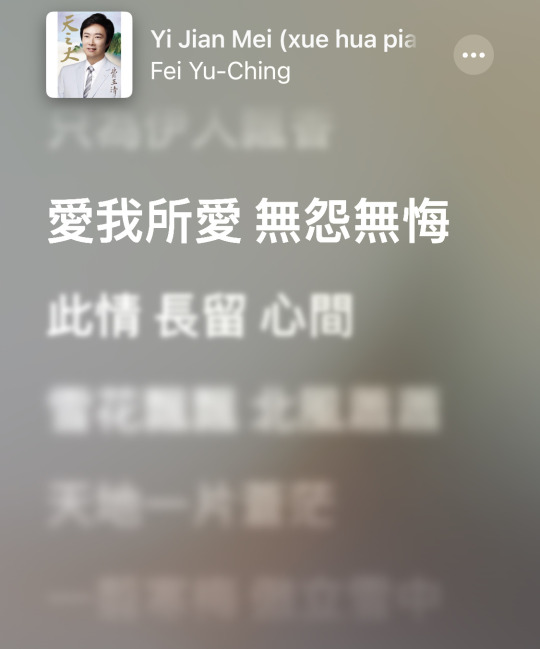
真情像草原廣闊
zhen qing xiang cao yuan guang kuo
The truth is like the grassland
層層風雨不能阻隔
ceng ceng feng yu bu neng zu ge
The wind and rain can not stop
總有雲開 日出時候
zong you yun kai ri chu shi hou
There’s always a cloud at sunrise.
萬丈陽光照耀你我
wan zhang yang guang zhao yao ni wo
The sun shines on you and me
真情像梅花開過
zhen qing xiang mei hua kai guo
True love is like a plum blossom
冷冷冰雪不能掩沒
瞭解詳情
leng leng bing xue bu neng yan mei
Cold and ice can not cover it
就在最冷 枝頭綻放
jiu zai zui leng zhi tou zhan fang
The branches always bloom during the coldest weather
看見春天走向你我
kan jian chun tian zou xiang ni wo
See the spring towards you and me
雪花飄飄北風嘯嘯
xue hua piao piao bei feng xiao xiao
The snow is fluttering and the north wind is whistling
天地 一片 蒼茫
tian di yi pian cang mang
The world is vast
一剪寒梅 傲立雪中
yi jian han mei ao li xue zhong
A cold plum standing proudly in the snow
只為 伊人 飄香
zhi wei yi ren piao xiang
Only fragrance for the beautiful girl
愛我所愛無怨無悔
ai wo suo ai wu yuan wu hui
Love what I love without regret
此情 長留 心間
ci qing zhang liu xin jian
This love long stays in my heart
0 notes
Text
an ongoing list of the cast overlap between the 《千秋》 and 《天涯客》 audiodramas, because this is apparently the hill upon which I will lose my mind:
夏磊 Xia Lei: Shen Qiao // Zhou Zishu
柯暮卿 Ke Muqing: Yu Shengyan, Chen Gong (donghua) // Jing Beiyuan, Liang Jiuxiao
风袖 Feng Xiu: Shi Wu // Zhang Chengling
孙晔 Sun Ye: Guang Lingsan (audiodrama) // Ye Baiyi
谢添天 Xie Tiantian: Sang Jingxing (audiodrama), Yu Ai (donghua) // Wen Kexing
海帆 Hai Fan: Yi Pichen // Yu Qiufeng, title card reader
吕书君 Lv Shujun: Li Qingyu // Cao Weining
苏鑫 Su Xin: Ruyan Kehui // Zhao Jing
不一 Bu Yi: Duan Wenyang (donghua) // Deng Kuan
bonus:
吴磊 Wu Lei: Yan Wushi // Shen Qingqiu (SVSSS donghua)
沈达威 Shen Dawei: Chen Gong (audiodrama), Guang Lingsan (donghua) // Xiezi (TYK audiodrama) // Luo Binghe (SVSSS donghua), Ron Weasley (in the Chinese dub of the Harry Potter movies, if anyone’s curious)
魏超 Wei Chao: Qi Fengge // Xiao Jingrui (LYB), Luo Ji (《三体》...literally what)
#I... what#I can't decide whether I should be incensed about professional competence#or like#giggle about cross-casting jokes#千秋 backlog#zhou zishu comedy hours#voice(bear) appreciation hours
20 notes
·
View notes
Text
Prince of Tennis (2019) Characters
This list was made based on the Chinese and Japanese Wikipedia entries for Prince of Tennis (2019), and the Dramawiki for the names of most of the actors. Please let me know if you spot any mistakes/ have any more to add!
Legend: [CHN Character name] [Name in Chinese characters] (Actor): Original JPN Name
Names with readings I'm not sure of are in italics
Yu Qing 育青 / Seishun Academy
Lu Xia 路夏 (Peng Yu Chang): Echizen Ryoma
Mu Siyang 穆司陽 (Xie Bin Bin): Tezuka Kunimitsu
Qiao Chen 喬晨 (Dong Li): Momoshiro Takeshi
Chi Dayong 池大勇 (Zhu Zhi Ling): Oishi Shuichiro
Zhuo Zhi 卓治 (Zhang Yi Jie): Fuji Syusuke
Tang Jiale 唐佳樂 (Xu Ke): Kikumaru Eiji
Yan Zhiming 嚴智明 (Li He): Inui Sadaharu
He Xinglong 賀興隆 (Fan Lin Feng): Kawamura Takashi
Zhang Baiyang 張百揚 (Wu Xu Dong): Kaidoh Kaoru
Qi Ying 齐瑛 (Song Yi Ren): Ryuzaki Sakuno
Peng Shang 彭湘 (Lu Jia): Osakada Tomoka
Huang Jing 黃靖 (Yu Kai Ning): Combination of Arai, Sasabe, etal
Ma Xiuwen 馬修文 (Zhang Ke Yuan)
A Mu 阿穆 (Li Jun Zheng)
Qi Na 齐娜 (He Jia Yi): Ryuzaki Sumire
Lu Xiangqian 路向前 (Wu Qi Jiang): Echizen Nanjiroh
Hao Dahe 郝大河 (Jin Yu Bo): Yamato Yudai
Yu Hang 育航 / Gyokurin
Bu Zhongchuan 钟歩川 (Jin Hao Chen): Fukawa Kimiyoshi
Wu Quan 吴泉 (Zhang Hang [YOUNG-G]): Izumi Tomoya
Yu Feng 玉峰 / Fudoumine:
Xu Ziping 徐子平 (Chen Shang Ze): Tachibana Kippei
Yan Jiang 燕江 (Wang Yong Feng): Sakurai Masaya
Shi Tienan 旋铁男 (Yang Chen Yi): Ishida Tetsu
Sima Yiwu 司马亦武 (Kong Chui Nan): Ibu Shinji
Shen Weiming 申伟明 (Liu Cheng Lin): Kamio Akira
Chen Desen 陈德森 (Gu Yu): Mori Tatsunori
Wei Kefei 韦克飞 (Ming Peng): Uchimura Kyosuke
Xu Xingzi 徐杏子 (Sun Jia Yu): Tachibana An
Xing Yao 星耀 / Hyotei Academy
Ji Jingwu 纪景梧 (Ren Yan Kai): Atobe Keigo
Hua Chonghong 华崇宏 (Yu An): Kabaji Munehiro
Hu Liangliang 胡亮亮 (Yang Ze): Shishido Ryo
Song Ci 宋慈 (Shi Zi Xun): Akutagawa Jiroh
You Shixing 游世星 (Fan Xiao Dong): Oshitari Yuushi
Yue Yang 岳阳 (Gao Xin): Mukahi Gakuto
Ji Nuo 吉诺 (Jiang Xin Qi): Hiyoshi Wakashi
Feng Zhiyuan 冯志远 (Jin Zhong Xi): Ootori Choutaro
Coach Fu 付教錬 (Tian Jia Da): Sakaki Tarou
No. 3 (Shisan) High School 市三 / Yamabuki
Ya Jiuxin 亚久辛 (Wang Yan Yang): Akutsu Jin
Shen Qianshi 沈千石 (Lou Ming): Sengoku Kiyosumi
Nan Jianzhi 南建知 (Liu Yu Feng): Minami Kentarou
Tan Yitai 谭一泰 (Huang Xing Yuan): Dan Taichi
Fang Yadong 方亚东 (Peng Gang): Higashikata Masami
Ma Lintao 马林涛 (Zhang Yuan Kun): Muramachi Tohji
Coach Tian 田教練 (Hong Wei): Banda Mikiya
Chen Huijing 陳慧敬 (Yang Cai Ying): Akutsu Sayuri
Guo Zi 國子 / St. Rudolph
Zhuo Yu 卓宇 (Zhao Zi Qi): Fuji Yuuta
Guan Yue 关岳 (Lan Bo): Mizuki Hajime
Qiao Ze 乔泽 (Liu Ming Kai): Akazawa Yoshiro
Ling Tian 梁田 (Jerry Chang): Kaneda Ichiro
Liu Zecheng 刘泽成 (Tang Xiang En): Yanagisawa Shinya
Qin Yifei 秦一婓 (Deng Zhi Yuan): Kisarazu Atsushi
No. 6 (Di Liu) 第六 / Rokkaku
Kui Jian 奎建 (Lei Ming): Aoi Kentaro
Yu Zifeng 余子风 (Fu Yan Zhang): Kurobane Harukaze
Lin Xiyan 林希彦 (Yao Jun Zhe): Itsuki Marehiko
Tian Ye 田野 (Wang Hao Yu): Amane Hikaru
Zuo Xiaohu 左小虎 (Li Zheng Jun): Saeki Kojiro
Mu Jinliang 穆金亮 (Zhai Xu): Kisarazu Ryo
Liu Muyun/Mr. Six 劉牧雲/六爷 (Hou Tong Jiang): Oji
Hai Guang 海广 / Rikkaidai
Bai Shiting 白市廷 (Ren Yun Jie): Yukimura Seiichi
Tian Zilong 田子龙 (Xiang Yun Long): Sanada Genichiro
Ke Jie 柯杰 (Tan Xu): Jackal Kuwahara
Liu Lian 柳濂 (Wang Yi Bo): Yanagi Renji
Jin Wentai 金文太 (Cao Jun Xiang): Marui Bunta
Yuan Chi 袁驰 (Shen Qi): Kirihara Akaya
Wang Yaren 王雅人 (Xu Rui Lin): Nioh Masaharu
Lu Sheng 吕胜 (Li Shu Ren): Yagyuu Hiroshi
Ying Cai 英才 / Ginka
Xiang Jingtian 向静天 (Chen Peng Wan Li): Fukushi Michiru
Chen Dahai 陈大海 (Ma Wenchao)
Lin Ye 林叶 (An Zi Yang)
Other Characters
Sha Sha 沙莎 (Liu Yong Xi): Shiba Saori
Li Na 李娜 (Li Na) [Bookstore owner]
Jiang 姜 (Jiang Shang): Tatsugoro [Racquet repair man]
*(2020.03.11) Fixed typo on Bai Shiting's actor name. Thanks to @tsunaminh for pointing it out!
*(2020.03.16) Fixed Ji Nuo's name! Thanks to @rlkkai for pointing it out!
*(2020.04.08) Fixed typo in Lu Xiangqian's name
#prince of tennis#prince of tennis 2019#match! tennis juniors#chinapuri 2019#fen dou ba shao nian#chinese prince of tennis
94 notes
·
View notes
Text
Annals of Yanxing 2 (472)
[From WS007. Trouble with the Ruanruan.]
2nd Year, Spring, 1st Month, yimao [27 January], the Hu people of the Tongwan Garrison led each other north in rebellion. Decreed the General who Soothes the South, the Duke of Jiaozhi, Han Ba, and others, to pursue and wipe them out.
The chieftain of the Dayang Man, Huan Dan, led his households to belong to the interior. He was designated General who Conquers the South, and ennobled Duke of Xiangyang.
A limited amnesty for the Imperial City and West of He, reaching south until Qin and Jing, west until Fuhan, north until the various garrisons of Liang province.
Decreed the Provisional Outer Staff Cavalier in Regular Attendance, Xing You, as envoy to Liu Yu.
2nd Month, yisi [17 March], a decree said:
Nifu received from above the bearing of an insightful sage, his body born with a capacity for knowledge. Thoroughly bringing to order his full nature, the Way shone in the Four Seas. A while ago, when Huai and Xu were not yet deferential, temple partitions were not in place, bringing about and causing the sacrificial scriptures to gradually be ruined, and the ritual chapters to wane and be snuffed out. Thereupon [they] made female shamans and uncanny wizards irregularly advance contrary to the rites, kill the living, drum and dance, performers and entertainers debauching and disrespecting. How is that the means by which to venerate the enlightened gods and respect the Way of the Sage!
From now on and afterwards, when there is worship at Master Kong's temple, regulate to employ alcohol and dried meat, and that is all. Do not heed women and girls gathering and mingling so as to pray for blessings of the unexpected. Transgressors who go against the regulations will be judged.
Should the public house have affairs, itself will follow the regular rites, sacrificing animals and millet vessels, applying itself fully to finest and unsullied. When presiding over affairs with the utmost respect, orders will be dignified like this. The offices of shepherds and ministers will clarify and bring together what is not the norm, and make prohibitions and orders certain to be done.
[Nifu is another name for Master Kong.]
The Ruanruan transgressed the frontier. The Grand High August Emperor stayed in the northern suburbs. Decreed the various generals to chastise them. The miscreants escaped and ran. Their detached leader Adagan led more than 1 000 family groups to come and surrender.
The Chile of the Eastern Section ran to the Ruanruan. The Grand High August Emperor pursued them, reached Shiqi [lit. “stone gravel” or “rock desert”], but did not catch up and turned back.
On renzi [24 March], the state of Gaoli dispatched envoys to court with tribute.
3rd Month [25 March – 23 April], the Grand High August Emperor arrived from the northern chastising.
On wuchen [9 April], used the Cavalier in Regular Attendance and Chief Commandant of Escort Horses, Wan Anguo, as Great Marshal and Great General, ennobled as King of Ancheng.
On gengwu [11 April], the Chariot Drove to plough at the sacred fields.
Shicheng commandery captured Cao Pingyuan and sent him off to the Imperial City. Beheaded him.
The Chile of Lianchuan planned rebellion, moved and assigned them to Qing, Xu, Qi, and Yan provinces as encampment households.
Summer, 4th Month, gengzi [11 May], decreed that artisans and merchants with varied ability were to fully heed to attend to agriculture. The various provinces and commanderies to examine the people and increase the planting of vegetables and fruit.
On xinhai [22 May], Liu Yu dispatched envoys to court with tribute.
On guichou [24 May], decreed srmanas did not get to leave the monasteries to drift and roam among the people. Travellers would depend on official writings.
This Month [24 April – 22 May], Liu Yu died. His son Yu# was usurpingly installed.
5th Month, dingsi [28 May], decreed the army to vigilantly look after the imperial seal and transmitted tokens, and next to look after horse seals.
6th Month [22 June – 21 July], the people of An province came across floods and hail. Donated taxes to relieve and aid.
On bingshen [6 July], a decree said:
A while ago, when the provinces and commanderies selected endorsement, many did not do so sincerely. Large people by these means ended up living secluded and petty. Mean men by these means jumped over their allotment to frivolously advance. How will that spoken of as adorning the worthy and planting virtue! The present year's endorsed and recommended particularly were an overflow of mediocrity. From now on, when dispatching, all will be exalted from the furthest gates in the province and commandery, and selected from the utmost talent in the villages and hamlets.
Intercalary Month, renzi [22 July], the Ruanruan robbed Dunhuang. The garrison commander, Yu Duohou, struck and ran them off. They also robbed Jinchang. The defence commander Xue Nu struck and ran them off.
On wuwu [28 September], travelled to favour Yin Mountain.
Autumn, 7th Month [20 August – 19 September], people of Guang province, Sun Yan and others, assembled a faction of more than 1 000 people to rebelliously communicate with Liu Yu#. The Inspector, Shusun Gui, chastised and pacified them.
On xnchou [9 September], the state of Gaoli dispatched envoys to court with tribute.
On renyin [10 September], decreed the provinces, commanderies, and counties each to dispatched two people with talent qualified to reply on their own, to attend the 9th Month's military exercises, and be personally asked about manners and customs.
8th Month, bingchen [24 September], the state of Baiji dispatched envoys to offer a petition to request a host to attack Gaoli.
On xinyou [29 September], the states of Didouyu and Kumoxi dispatched envoys to court with tribute. The state of Changting dispatched envoys to present Shu horses.
The Feiyetou of West of He rebelled. The Bogulu Garrison Commander struck and ran them off.
9th Month, xinsi [19 October], the Chariot Drove to return to the Palace.
On wuxu [5 November], the Garrison Commander of Tongwan, the King of Hejian, Lü Hupi, was convicted of avarice and cruelty, and bestowed death.
On jiyou [16 November], decreed since in 11 of the provinces and garrisons there were floods, donated to the people the land taxes, and opened the granaries to relieve and aid. Also decreed that the people who were roaming and dispersing were all ordered to turn back to their original [homes]. Those who disobeyed were assigned and moved to the border garrisons.
Winter, 10th Month [17 November – 15 December], the Ruanruan transgressed the frontier, reaching Wuyuan.
11th Month [16 December – 14 January], the Grand High August Emperor personally chastised them, and was about to cross the desert to assault and strike. The Ruanruan heard the army had arrived, they were greatly afraid and fled north for several thousand li. Since the destitute robbers had escaped faraway, it was not possible to pursue. Therefore desisted.
On dinghai [24 December], ennobled august junior uncle Lüe as King of Guangchuan.
On renchen [29 December], allotted and dispatched envoys to tour and scrutinize the manners and customs, and ask about the people's ills and hardships.
The Emperor every month was one morning at the Chongguang Palace.
12th Month, gengxu [16 January], a decree said:
The Documents state: “After three years there was an examination. After three examinations demoted and promoted the dim and the clear.” Since a while ago and onwards, officials who had worked for advancement, were replaced before long. Shepherds and wardens without a heart for helping the people, who compete to make assemblies and levies, send off the old and welcome the new, and link up with each other on the roads. Not the means by which to strengthen the people's aspirations, and prosper the Way of governing.
From now on, shepherds and wardens who are mild, humane, pure and prudent, and those who have achieved already service to the public, can stay at their posts. When the amassing of years is complete, move their rank one grade. They who have avarice and cruelty and not the Way, and those who infringe upon and diminish the numerous myriads, even though they have been in office for the first time, must be demoted and disciplined. Publish it in an order [so that it] will forever be the universal norm.
Decreed that since the affairs of Dai commandery were similar to Feng and Pei, those of the people of Dai who had previously been assigned to border defences were all relieved from it.
[Feng town in Pei county was the original birth place of Han Gaozu and had been exempted from taxes.]
8 notes
·
View notes
Text
DW Potential Additions Tier List
So I made some spreadsheets but decided I was putting in too much work so here’s a quick summary.
I was grading on a scale of 1-5. 1 was characters I really don’t htink would add anything good, but who I thought some might suggest (like Cao Zhi, Jia Nanfeng, Pan Zhang, Zhao Guang, Zhang Ren, etc.) 2 is people who could maybe work under very specific circumstances, like a big narrative shift or a lot of related characters being added, or who might be fine but aren’t nearly as good as some other options (like Cheng Yu, Cao Xi, Wu Jing, Mi Zhu, or Gao Gan). These don’t really make the cut for discussion, so if you don’t see a name you’re expecting, I probably put them in one of those tiers for some reason.
Tier 3 are characters who would be fine. Just fine. They either did enough to make themselves noteworthy, or have enough of a connecting to existing narrative and cast that they’d probably add something worthwhile. Not the ones I’d be most excited about, but the ones I couldn’t make too many complaints over.
Tier 4 are great adds. Characters I really want to see, who could really expand the cast in worthwhile ways.
Tier 5 are characters I forget aren’t in these games already because why are they not here?
I’m not going to explain every decision here because I’m sure there will be followup questions. Yes, I’m aware that Jin is overrepresented, because it’s the smallest of the main factions.
TIER 5
Lady Bian (Wei)
Zhang Xiu (Wei; previously Dong Zhuo, Liu Biao)
Zang Ba (Wei, previously Tao Qian, Lü Bu)
Cao Zhen (Wei)
Zhong Yao (Wei)
Xiahou Xuan (Jin)
Xun Yi (Jin)
Chen Tai (Jin)
Guanqiu Jian (Jin)
Wen Qin (Jin)
Yang Huiyu (Jin)
Hu Lie (Jin)
Hu Fen (Jin)
Lady Wu (Wu)
Zhang Zhao (Wu)
Zhuge Jin (Wu)
Lü Ju (Wu)
Zhu Yi (Wu)
Zhuge Ke (Wu)
Zhuge Zhan (Shu)
Jian Yong (Shu)
Zhang Ni (Shu)
Fei Yi (Shu)
Liu Biao (Other: Liu Biao)
TIER 4
Wen Pin (Wei; previously Liu Biao)
Xiahou Shang (Wei)
Cao Hong (Wei)
Jiang Ji (Wei)
Zhu Ling (Wei; previously Yuan Shao)
Dowager Guo (Jin)
Cao Shuang (Jin)
He Yan (Jin)
Pei Xiu (Jin)
Sima Fu (Jin)
Fu Jia/Gu (Jin)
Wang Ji (Jin)
Wang Ling (Jin)
Du Yu (Jin)
Sima (Gaoling) (Jin)
Sima Wang (Jin)
Shi Bao (Jin)
Sun Luban (Wu)
Sun Ben (Wu)
Sun/Yu He (Wu)
Jiang Qin (Wu)
Lü Fan (Wu)
Zhu Huan (Wu)
He Qi (Wu)
Quan Zong/Cong (Wu)
Zhuge Jing (Wu)
Tao Huang (Wu)
Wu Yan (Wu)
Lady Gan (Shu)
Liu Feng (Shu)
Ma Zhong (Shu)
Wang Ping (Shu)
Yuan Tan (Other: Yuan Shao)
Qu Yi (Other: Yuan Shao)
Tadun (Other: Yuan Shao, Wuhuan)
Shen Pei (Other: Yuan Shao)
Xu Rong (Other: Dong Zhuo)
Gao Shun (Other: Dong Zhuo, Lü Bu)
Gongsun Zan (Other: Gongsun Zan)
TIER 3
Cao Rui (Wei)
Guo (Nuwang) (Wei)
Chen Deng (Wei; previously Tao Qian, Lü Bu)
Zhang Changpu (Wei)
Wang Lang (Wei; previously Tao Qian, Liu Yao)
Sima Lang (Wei)
Jia Kui (Wei)
Du Xi (Wei)
Li Tong (Wei)
Cao Zhang (Wei)
Zhao Yan (Wei)
Cao Jie (Wei)��
Li Feng (Jin)
Zhong Yu (Jin)
Qin Lang (Jin)
Wang Chang (Jin)
Sima Liang (Jin)
Sima Zhou (Jin)
Sima Jun (Jin)
Yang Hu (Jin)
Sima Yan (Jin)
Wei Guan (Jin)
Zhang Hua (Jin)
Tang Bin (Jin)
Jiang Ban (Jin)
Hu Zun (Jin)
Pan Shu (Wu)
Sun Luyu (Wu)
Sun Jing (Wu)
Sun Yu (Wu)
Sun Jiao (Wu)
Sun Shao (Bohai) (Wu)
Widow Xu (Wu)
Gu Yong (Wu)
Gu Tan (Wu)
Bu Zhi (Wu)
Chen Wu (Wu)
Dong Xi (Wu)
Zhu Zhi (Wu)
Zhu/Shi Ji (Wu)
Yu Fan (Wu; previously Liu Yao)
Lu Kang (Wu)
Lü Dai (Wu)
Pan Jun (Wu; previously Liu Biao, Shu)
Lu Kai (Wu)
Teng Yin (Wu)
Sun Jun (Wu)
Zhang Ti (Wu)
Wu Yi (Shu; previously Liu Zhang)
Wu Ban (Shu; previously Liu Zhang)
Zhang Shao (Shu)
Lady Ma (Shu; previously Liang Warlords)
Mi Fang (Shu; previously Tao Qian)
Lady Mi (Shu; previously Tao Qian)
Dong Yun (Shu)
Ma Liang (Shu)
Ma Su (Shu)
Chen Zhi (Shu; previously Liu Zhang)
Huo Jun (Shu; previously Liu Biao)
Huo Yi (Shu)
Luo Xian (Shu)
Yang Yi (Shu)
Li Hui (Shu; previously Liu Zhang)
Jiang Wan (Shu)
Deng Zhi (Shu)
Zhang Yi (Bogong) (Shu)
Liao Hua (Shu)
Lady Liu (Other: Yuan Shao)
Yuan Shang (Other: Yuan Shao)
Tian Feng (Other: Yuan Shao)
Ju Shou (Other: Yuan Shao)
Li Jue (Other: Dong Zhuo)
Cai Yong (Other: Dong Zhuo)
Liu Qi (Other: Liu Biao)
Cai Mao (Other: Liu Biao)
Lady Cai (Other: Liu Biao)
Kuai Yue (Other: Liu Biao)
Huang Zu (Other: Liu Biao)
Gongsun Yuan (Other: Yan)
Yong Kai (Other: Nanman)
Gaoding (Other: Nanman)
Liuzhou (Other: Nanman)
Liu Yao (Other: Liu Yao)
17 notes
·
View notes
Text
Cao Jiong’s “Discourse on the Six Dynasties” (Short Version)
This is a shorter version of this post.
Discourse on the Six Dynasties
By Cao Yuanshou
Among the dynasties of ancient times, Xia, Yin (Shang), and Zhou each lasted for dozens of generations, while Qin perished after only two. Why was this? Because the lords of those three dynasties shared control of the people of the realm, thus the lords of the realm saw the sovereign's concerns as their own concerns, while the kings of Qin monopolized control of the people, thus in times of danger and distress no one was willing to come to their aid. Those with whom you share your joys will likewise sympathize with your sorrows; those you make your peers in peace will be your saviors when danger comes. The ancient kings knew that the sovereign who reigned alone could not ensure an orderly realm for long, thus they shared power with others in order to obtain stability; they knew that the ruler who defended the realm alone could not guard it forever, thus they shared responsibility with others in order to attain security. Both their intimate relatives and their distant kinfolk were employed; both members of their clan and outsiders from other surnames were advanced. Those of more or less power worked together to protect each other; those of the same or different blood acted in concert to shield one another. There were neither instances of "total annexation", nor were "traitorous impulses" allowed to fester.
Even when the Zhou dynasty was in decline, Duke Huan of Qi and Duke Wen of Jin still treated the King with respect and acted on his behalf. When the state of Chu refused to present its tribute of grass and thatch to the King, the state of Qi led an army to punish them; when the state of Song refused to help build walls around the King's capital at Chengzhou (Luoyang), the state of Jin executed their minister. Though the King's laws became lax and loose for a time, they were once again enforced; though the feudal lords become arrogant for a season, they were once more reverent.
It was said that "after the age of these two Hegemons (Dukes Huan and Wen), the feudal lords became boorish and remiss". Indeed, the states of Wu and Chu were defiant, trusting in the Yangzi to be their bulwark and the stout square walls of their cities to be their rampart. Yet though in their hearts they sought to "inquire after the Nine Tripods" (as though they had more right to dominion than the King), even then they feared to go so far as to outright threaten or oppress the royal clan. Wicked feelings scattered in the breast; treasonous plots died on the lips. Was it not because the King had trusted and empowered his kinfolk and relatives and employed and used the worthy and able? Don't the branches and the leaves grow great and luxurious because the roots and the stem depend upon them?
But from that time on, incessant fighting broke out between the states. Wu was taken over by Yue, and Jin split into three; Lu was conquered by Chu, and Zheng was annexed into Hann. Although originally most of the families of the feudal lords had come from the royal Ji family, by the time of the Warring States era, most of these royal relatives were long gone, and only in the states of Yan and Wey did they still rule. What was left of the King's domain was small and pathetic, threatened by powerful Qin to the west and menaced by fearsome Qi and Chu to the south; though they sought deliverance from their destruction, there was no one left to take pity on them. And even after King Nan was deposed to become a commoner, still the branches of the state grasped at each other's power, squabbling over an empty title. For more than forty years, the land within the Seas had no master.
The state of Qin occupied a powerful and influential region and was crafty at the arts of lying and deceit. Thus they were successful in their campaigns against the lords east of the mountains and were able to nibble the Nine States down to nothing. And by the time of the First Emperor, the imperial throne was once again filled. Yet when Qin employed force like this and a lack of virtue like that, how could they expect to last? In what sense did they have deep roots or a thick stem, to prevent themselves from being yanked up?
The Book of Changes states, "Though they cry 'perish, perish', he plants himself firm like a mulberry." Zhou was virtuous, and their longevity was because of it; such a verse could well describe them.
When the First Emperor of Qin considered the decline of Zhou, he felt that it was the weakness of the Zhou kings that had caused them to lose power. Thus he abolished the old system of the Five Noble Titles and organized the realm into commandaries and counties instead, and he threw out the methods of teaching the people through music and ritual behavior in favor of imposing stern and harsh government. His younger relatives received not an inch of land as fief, and his accomplished ministers had not a spade of land to call their own. Within, there were no royal relatives who might assist the state, and without, there were no feudal lords who might shield the realm from harm. He did not show a benevolent heart towards his flesh and blood, nor extend any kindness towards those who might have served as his branches and leaves. He was like a person who cuts off their own arms and legs, content to live as a mere torso; he was like a ship which, before crossing a wide river or a deep ocean, throws away its oars. There were many whose hearts turned cold when considering the danger of such a situation. Yet the First Emperor remained serene, believing that the capital area of Guanzhong was such an impenetrable region, a "bastion of golden walls and a thousand li", that his descendants would rule as sovereigns for ten thousand generations. Wasn't it ridiculous?
At the time, Chunyu Yue tried to remonstrate with him. He told the First Emperor, "I have heard that the Kings of Yin and Zhou granted fiefs to their relatives and their accomplished ministers, and their dynasties lasted for more than a thousand years. Now Your Majesty has become lord of all the realm within the Seas, yet your relatives are no more than commoners. Someday our dynasty might face the same threat of usurpation as happened with Tian Chang in Qi or the Six Ministerial Clans in Jin, yet Your Majesty has not provided for any powerful subjects who might help to guide affairs in the capital; who would step in to save the royal family? I have never once heard of any state which failed to heed the teachings of the ancients in these matters and yet long endured."
But the First Emperor dismissed these principles and heeded the advice of Li Si instead. And thus, on the day of his death, there was no one to whom he could entrust the future of the state. The weighty decisions of the realm were left in the hands of a miscreant, and the power to decide who and who would not inherit the throne was left to the words of a wicked subject. People like Zhao Gao were even able to bring about the slaughter and uprooting of the royal family.
Ying Huhai (the Second Emperor) had been instructed in the teachings of severity and oppression since youth, and he honored the philosophies of violent men as an adult. Rather than change the regulations and alter the laws of his father, he continued the models of Shen Buhai and Shang Yang, he consulted and plotted with Zhao Gao, he isolated himself deep within the palace, and he entrusted the governance of the realm to slanderous bandits. When at the last he met his end at Wangyi Palace, though he begged to be spared to live as a commoner, how could he have expected anyone to show him mercy?
Thus were the commandaries and the states alienated from Qin, and the people deserted and rose against them in rebellion; Chen Sheng and Wu Guang were the first to sound the call against them, and Liu Bang and Xiang Yu buried them in the end. If only the First Emperor has accepted the advice of Chunyu Yue and rejected the words of Li Si, if he had carved up the provinces and fiefs, empowered his younger relatives as Princes, granted domains to the descendants of the three dynasties (Xia, Shang, and Zhou), and repaid the deeds of his subjects by rewarding them with their own domains! Then the regions of the realm would have had settled lords and the people familiar masters. Branches and leaves could support one another; the head and the tail could work in tandem. Even if some of the successors of the Son of Heaven went astray, there were no great heroes in those days like Tang of Shang or King Wu of Zhou; the leader of any wicked plan would have been snuffed out before anything could be done, and how could the rabble of people like Chen Sheng or Xiang Yu have gotten anywhere?
When Gaozu of Han (Liu Bang) drew his three-foot sword and led his flock of crows to war, it only took five years before he had completed his imperial enterprise. In all of history, no one was ever able to achieve such a thing as easily as he did. But it was only natural. To chop down a tree with a thick trunk is a difficult undertaking, while to smash a bunch of rotten wood is easily accomplished.
Gaozu reflected upon Qin's mistakes, and he granted fiefs to his younger relatives. Thus when the clan of Empress Lü Zhi monopolized power in the capital and plotted to seize control from the Liu clan, the reason why the realm did not support them or the common people lose faith in the dynasty was because the feudal lords were great and powerful and the foundation of the dynasty was firm and deep. The Marquis of Dongmou (Liu Xingju) and the Marquis of Zhuxu (Liu Zhang) upheld the dynasty from within the capital, while the Princes of Qi (Liu Xiang), Dai, Wu, and Chu acted as guardians without. If Gaozu had followed in the footsteps of Qin and forgotten the systems of the ancient kings, then the realm would have passed from their hands then and there, and the Liu clan would have been supplanted.
Yet in his granting of fiefs and domains, Gaozu went beyond what the ancient kings had done. The greatest of the Princes had territories that straddled provinces and combined regions, while the lesser ones still controlled dozens of cities. There was no distinction between the Emperor and the Princes, for they wielded power on par with that of the royal family. This was what led to the Rebellion of the Seven Princes, Wu and Chu foremost among them. Jia Yi tried to warn of the impending danger, saying, "The feudal lords have become too strong and prosperous, and if the situation continues, turmoil will arise. For those who wish to ensure peace and order in the realm, there can be no greater policy than to multiply the number of the feudal lords while diminishing the power of each one. For when the spread of power within the Seas is like the relation of the arms to the body, or of the fingers to the arms, only then will those below lack hearts of treason or rebellion and those above lack any need to attack or punish the lords." Yet Emperor Wen did not listen to his advice, and his successor Emperor Jing rashly heeded Chao Cuo's plan to directly strip territory from the feudal lords; this only brought about anger and resentment among the close relatives and fear and trembling among the distant ones, and when the Princes of Wu and Chu sounded their call of rebellion, the other five Princes joined them.
What was sown during the reign of Gaozu reached fruition during the reigns of Emperors Wen and Jing; fiefs and domains were granted more generously than had been the case in ancient times, and the attempted solution was too hasty. When the tip is too large, it breaks off; when the tail is too big, it is difficult to move. Even when the tail is proportional to the body, sometimes it is still difficult to make it move; how much more does this apply when the tail has grown beyond all reason?
Emperor Wu of Han followed the strategy of Zhufu Yan, by implementing a policy of "grace", splitting up the inheritance of the feudal lords by distributing their domains among all their sons. Thus the princely fief of Qi was split into seven parts, Zhao into six, Liang and Dai into five, and Huainan was cut into three. And in later years the feudal lords were bullied and cowed, their descendants becoming ever weaker; they only received sufficient pensions and supplies to provide for themselves, but no longer took any hand in governing their fiefs. Some had their territories reduced on charges of failing to provide sacrificial wine and gold; some had their titles abolished when they died without heirs.
By the time of Emperor Cheng, the Wang clan, imperial relatives by marriage, had taken control of court affairs. Liu Xiang remonstrated with Emperor Cheng for allowing the situation to come to such a state, saying, "I have heard that the imperial clan are the branches and leaves of the state. When the branches and leaves have fallen, then the roots and the stem no longer have any support or shade. By now, your relatives of the Liu clan are all distant and remote, while the partisans of your mother's family monopolize control and keep the royal family from power. To leave the royal clan weak and helpless is no way to preserve the altars of state or ensure the succession of the imperial line." But though Emperor Cheng was moved to grief by this plea, still he was unable to implement Liu Xiang's advice.
Thus it was that in the reigns of Emperors Ai and Ping, the Wang clan's control of the court was absolute; Wang Mang passed himself off as a wise regent like the Duke of Zhou, but in truth he was a usurper like Tian Chang. Though presenting a lofty salute, he had his eyes on the throne; in a single morning, he became master of all within the Four Seas. The princes and nobles of the imperial clan all surrendered their seals and handed over their ribbons of office to him and presented tribute to the altars of state. Yet some of them, still worried that they would not be able to save the lives of themselves and their families, went so far as to invent reports of omens approving of Wang Mang's usurpation and even sang his praises to extol his grace and virtue! Was it not pathetic?
Why did these things happen? Not because the members of the imperial clan were loyal and faithful during the reigns of Emperors Hui and Wen and traitors and opportunists during the era of Emperors Ai and Ping, but simply because their power and influence had grown so weak and useless that they no longer had any hopes of securing their positions.
It was thanks to Emperor Guangwu's peerless character and abilities that he was able to destroy the dynasty that Wang Mang had already put into place and restore the severed lineage of the Han dynasty. How else to explain this feat except that it was the work of a scion of the royal clan? Yet Emperor Guangwu failed to reflect upon the mistaken policies which had brought about Qin's downfall or to return to the old system as practiced by Zhou. Thus he trod the path of a doomed state, and he was fortunate that there was no trouble during his own reign.
But by the time of Emperors Huan and Ling, eunuchs manipulated the levers of authority. In the court, there were no servants willing to risk death for the sake of the state, and in the provinces, there were no subjects who saw the interests of the royal family as their own. Above, the sovereign stood alone, while below, his ministers grasped for power. The roots and the branches were unable to work in conjunction; the body and the hands could not help one another. Thus the realm descended into chaos like a roiling cauldron, and villains and wastrels sprang up on every side; the ancestral temples of the imperial clan were burned to ashes, and the palaces became overgrown with weeds and grasses. In all the Nine Provinces (the whole realm) there was not a single place of peace or safety. Was it not lamentable?
The Grand Progenitor of our Wei dynasty, Emperor Wu (Cao Cao), was a man of wise and sage character and possessed divine martial prowess and cunning. He lamented the fact that the sovereign's laws had sunk to such a pitiful state, and he pitied the dire plight of the Han royal family. Rising like a dragon from Qiao and Pei and soaring like a phoenix from Yanzhou and Yuzhou, he purged and swept away the villains and evildoers of the land, and he cut out and annihilated the behemoths and leviathans of the realm. He welcomed the Emperor's arrival from the western capital (Chang'an) and established a new capital at Yingyi (Xu). His virtue impressed Heaven and Earth, and his righteousness touched the people and the spirits. Thus the Han royal family recognized the will of Heaven and abdicated their position to the Wei dynasty.
It has now been twenty-four years since the founding of Wei. Have we not had ample time to consider the factors which led to the rise and fall of the five dynasties before ours? Yet we do not follow the policies which would ensure our longevity. We have seen the carts in front of ours topple and fall, yet we do nothing to change our course. The younger relatives of the imperial clan hold empty titles and only nominally possess their lands, and in no sense do they preside over their people; the imperial relatives only scurry about the streets and lanes, and they are given no voice in how to govern the state. Their authority is no greater than the commoners, and their influence counts for no more than the average person. Within, the state has no deep roots to fortify it against being pulled up; without, it has no foundation of relatives and friends who could help defend it. This is no policy to preserve the altars of state for ten thousand generations.
Furthermore, the Governors of provinces and the Administrators of commandaries in our times have become the modern equivalents of the Border Lords and the feudal nobles of antiquity. They hold sway over territories of a thousand li, and they wield military as well as civil authority. Some of them control regions comparable in size to princely fiefs, and in some instances brothers from the same family all hold such offices simultaneously. At the same time, not a single one of the imperial kinfolk or the younger relatives of the crown hold any position that might check the power of these local leaders or band together to guard against them. This is no way to strengthen the trunk and weaken the branches, or provide against any emergency.
Of the worthy servants of the dynasty from other families, some have reputations so great that they are household names in the capital, and some are commanders of powerful armies. Meanwhile, even those members of the imperial clan who possess civil talents are limited to positions no greater than supervisors of small counties, while even those with martial abilities lead bands of no greater than a hundred soldiers. These are honest and lofty men, and yet their ambitions can rise no higher than to bear a yoke; they are talented and capable fellows, yet they are shamed by being lumped in with those who are not their peers. This is no way to encourage and promote the worthy and able, or praise and distinguish members of the imperial clan with ceremony.
When the spring runs dry, it is because the groundwater has stopped flowing; when the trunk is rotten, it is because the leaves have withered. When the branches are abundant, they shelter the stem; when the twigs fall away, the trunk is left exposed. Thus it is said, "The centipede has its hundred feet; even in death, it does not collapse, for its numerous legs still keep it up." It is a little saying, but it illustrates a great principle.
Furthermore, the foundation of a stout wall cannot be laid all at once, nor can power and legitimacy be established in a single morning. In both cases, these things can be achieved only gradually and secured only over time. It is like a plant or a tree, which requires a great deal of time to grow before the roots extend deep and the trunk becomes strong, and greater still for its branches and leaves to multiply and flourish. Can someone who casts a seed among stones and thickets or beneath the palace gates expect the plant to grow fruitful and tall? Even if they surround it with blackish and rich soil and warm it by the springtime sun, they will not even be able to save it from withering. And what are the imperial relatives but trees sown by the sovereign, and what are the people but the soil which receives them? Unless the relatives be planted among them for a long time, then there will be obstinate below and disdain above. Even in peaceful times, there would still be the prospect of alienation or rebellion; how much moreso when some emergency arises?
The sage ruler does not relax during times of peace, but is always thinking of future dangers. Though their dynasty seems secure, still they make preparations to guard against threats to its destruction. Only then may they have no fear of being uprooted, though the storms and gales may blow; only then may they be assured the state will not collapse, though the realm be full of turmoil.
6 notes
·
View notes
Text
全职高手 (Quan Zhi Gao Shou/The King’s Avatar) Production Staff and Voice Actor Info
List of production staff and voice actors under the cut. I might update the voice actors as the season progresses, we’ll have to see.
制作人员
Production Staff
导演:熊可
Director: Xiong Ke
编剧:梁莎
Screenplay: Liang Sha
出品:阅文集团;企鹅影视;东申影业
Produced by: Yue Wen Group (aka China Reading Limited); Qi E Pictures; Dong Shen Pictures
联合出品:bilibili
Co-produced with: bilibili
出品人:罗立;王娟;李国栋
Producers: Luo Li; Wang Juan; Li Guodong
总监制:陈坤
Executive Producer: Chen Kun (aka Aloys Chen)
总制片人:王芸;金文君
Executive Editors: Wang Yun; Jin Wenjun
制片人:高丽华;郝博;佘媛媛
Editors: Gao Lihua; Hao Bo; She Yuanyuan
原著:蝴蝶蓝
Original Novel by: Hu Die Lan (aka Butterfly Blue)
执行监制:姜博文;李绍堂
Production Managers: Jiang Bowen; Li Shaotang
文学统筹:颜欢
Literary Coordinator: Yan Huan
商务:张天文;李茜茹;孙晨璐;赵莹;武冕
Commerce: Zhang Tianwen; Li Qianru; Sun Chenlu; Zhao Ying; Wu Mian
市场宣传:霍亚男
Marketing: Huo Ya’nan
内容支持:杜剑波
Content Advisor: Du Jianbo
美术支持:刘黎明;张天文;陆艺艺;陈晨;周丽娜;李洁
Art Advisors: Liu Liming; Zhang Tianwen; Lu Yiyi; Chen Chen; Zhou Li’na; Li Jie
游戏支持:马自军;田震;屈轶;宋霄;林睿;魏翼飞;刘泽
Game Advisors: Ma Zijun; Tian Zhen; Qu Yi; Song Xiao; Lin Rui; Wei Yifei; Liu Ze
原案设计:炎铃;夜光虫;sanama;高登七六;Mus;品奇;冰糖雪梨;御涵;查查
Adaptation Design: Yan Ling; Ye Guang Chong; sanama; Gao Deng Qi Liu; Mus; Pin Qi; Bingtang Xueli; Yu Han; Cha Cha*
音响监督:陈雨佳
Sound Director: Chen Yujia
作画监督:申琳
Animation Director: Shen Lin
配音导演:张杰
Dubbing Director: Zhang Jie
腾讯制片代表:金文君
Tencent Production Representative: Jin Wenjun
阅文制片代表:高丽华
Yue Wen Production Representative: Gao Lihua
动画制作:视美动画
Animation: Shi Mei Animation (aka G. CMAY Animation & Film)
角色配音
Voice Actors**
角色名称 配音演员
Character Name*** Voice Actor****
叶修 张杰
Ye Xiu Zhang Jie
苏沐橙 C 小调
Su Mucheng C Xiao Diao
孙翔 刘三木
Sun Xiang Liu Sanmu
刘皓 赵毅
Liu Hao Zhao Yi
崔立 商虹
Cui Li Shang Hong
吧台小妹 久任
Receptionist Jiu Ren
陈果 季冠森
Chen Guo Ji Guansen
月中眠 王晨光
Yue Zhong Mian Wang Chenguang
阳关 李进
Yang Guan Li Jin
柳色 龙吟
Liu Se Long Ying
渭城 小蛇
Wei Cheng Xiao She
暮云深 王敏纳
Mu Yun Shen Wang Minna
田七、云归 傅晨阳
Tian Qi/Yun Gui Fu Chenyang
浅生离 飞大团
Qian Sheng Li Fei Da Tuan
灯花夜 森中人
Deng Hua Ye Sen Zhong Ren
系舟 刺儿
Xi Zhou Ci Er
雷鸣电光 张赫
Lei Ming Dian Guang Zhang He
蓝河 杨天翔
Lan He Yang Tianxiang
知月倾城 咩咩
Zhi Yue Qing Cheng Mie Mie
唐柔 乔诗语
Tang Rou Qiao Shiyu
夜度寒潭 郭浩然
Ye Du Han Tan Guo Haoran
车前子 凌振赫
Che Qian Zi Ling Zhenhe
包子入侵 藤新
Baozi Ruqin Teng Xin
旁白、电视播音 李龙滨
Narrator/TV Broadcastor Li Longbin
NPC 小蛇、北辰、草摩琅琊、傅晨阳、飞大团、 李进、森中人、周湘宁
NPC Xiao She, Bei Chen, Cao Mo Lang Ya, Fu Chenyang, Fei Da Tuan, Li Jin, Sen Zhong Ren, Zhou Xiangning
*translator’s note: I’m 99.9% sure these aren’t real names
**translator’s note: I will try to update this list as the series progresses (NO GUARANTEES)
***translator’s note: some of these characters have yet to appear (as of episode 2). I’ve put the names of the characters in pinyin for now, if I have time to read the English translation of the novel I might add their English names on there, but this is all I have for now.
****translators note: again, some of these names are not real names
All the names listed above follow the format of a typical Chinese name (surname, first name).
for @kingsavatar-fan
Source
#quan zhi gao shou#the king's avatar#全职高手#production staff#voice actors#translation#my translation#holy shit that formatting killed me#ive never translated these technical terms in the film/animation industry so i hope theyre correct#if there are any mistakes please tell me!!!#also the formatting is a bit funky with my blog theme oops sorry#my translation: qzgs#my translation: text#my translation: chinese
8 notes
·
View notes